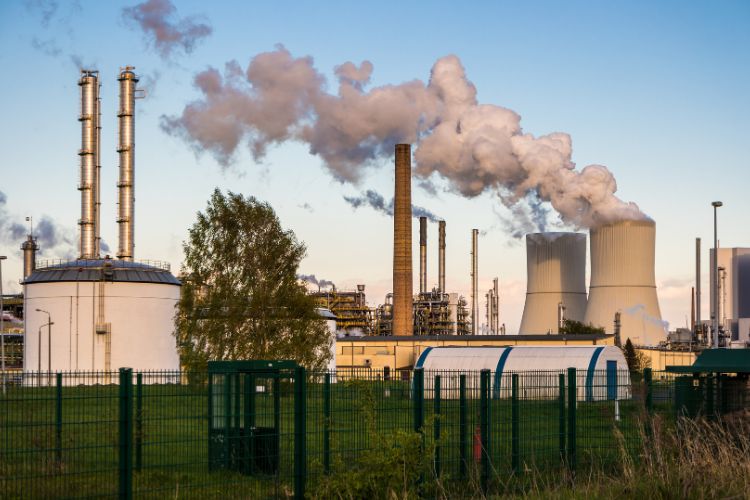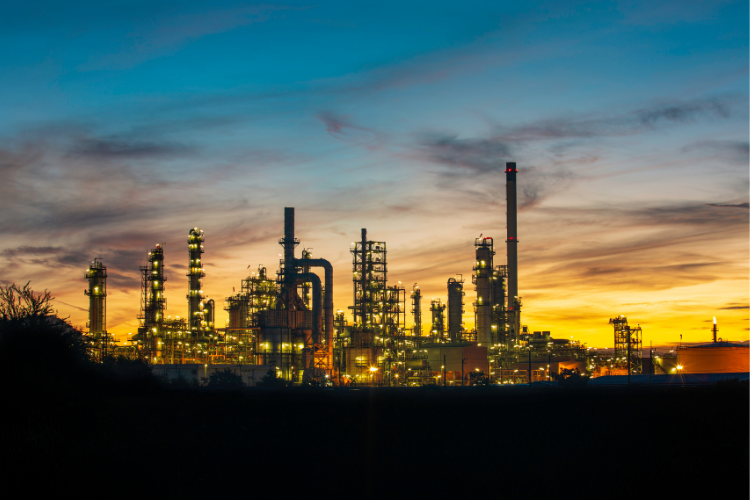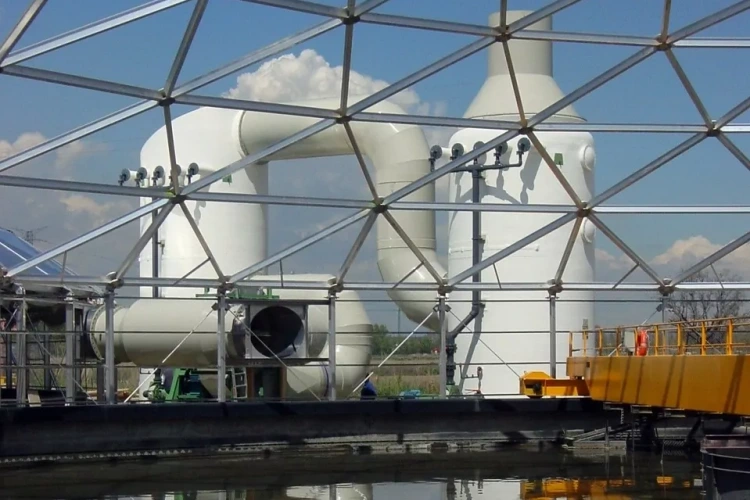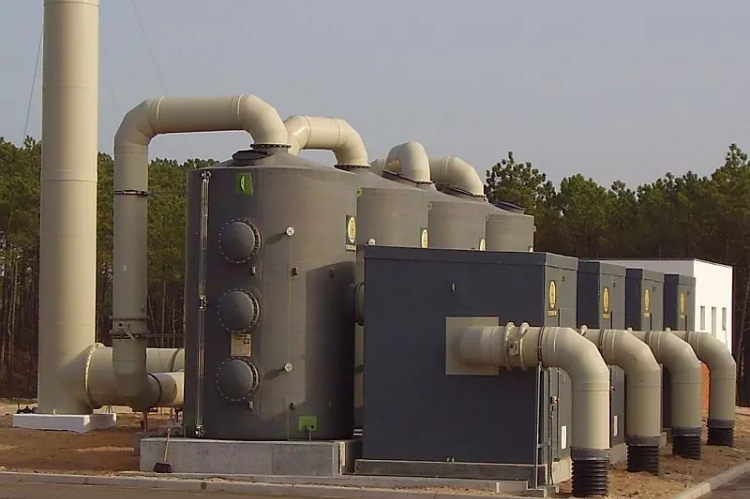How Scrubbing Technologies can help
Despite growing environmental awareness and ambitious climate targets, the chemical industry remains one of the most fossil-fuel-dependent sectors in Europe and beyond. From ammonia to methanol, production chains still rely heavily on natural gas and other hydrocarbons. This structural dependence poses a significant challenge to achieving net-zero goals, especially when global competitors benefit from cheaper energy and less stringent regulations.
In response, the European Commission has announced the creation of a Critical Chemical Alliance, aiming to secure essential production capacities, reduce import dependencies, and support decarbonisation across the sector. Against this backdrop, clean technologies such as gas scrubbing systems emerge as a practical and scalable solution. These systems not only reduce harmful emissions immediately but also support the gradual transition to low-carbon processes.
In this article, we’ll explore the current state of chemical sector decarbonisation, assess the role of scrubbing technologies, and highlight how companies like Tecnium are enabling sustainable transformation through adaptable and high-efficiency solutions.
The State of Decarbonisation in the Chemical Sector
Climate Commitments vs. Reality
A majority of chemical companies — over 70%, according to industry reports — have publicly committed to carbon neutrality by 2050 or earlier. Yet in practice, progress remains limited. Only a fraction of these companies have implemented concrete strategies or allocated significant investment toward emissions reduction.
Why? The answer lies in cost pressure, technological complexity, and the high energy demands of chemical production. Many key processes, especially those involving high-temperature reactions, are still technically and economically tied to fossil fuels. These include the production of ammonia, methanol, ethylene, and other building-block chemicals essential to countless downstream industries.



Technologies Still Based on Fossil Fuels
At the heart of this dilemma are units like steam crackers, which use large volumes of natural gas to break down hydrocarbons into fundamental chemicals like ethylene and propylene. These units are energy-intensive and not easily replaced or retrofitted.
Meanwhile, materials such as methanol remain 80% dependent on imports, exposing the EU to external volatility. Although e‑methanol and other green alternatives show promise, they currently face steep production costs, limited infrastructure, and constrained access to renewable energy sources.
All of this paints a clear picture: the path to decarbonisation in the chemical sector will be long and complex. Interim solutions are urgently needed — and this is where scrubbing technologies come into play.
Scrubbing Technologies: An Essential Tool for the Transition
Role of Gas Scrubbers in Pollution Control
Gas scrubbers are among the most effective technologies for controlling industrial air pollution, especially in sectors like chemicals, mining, and metallurgy. These systems are designed to capture and neutralize acid gases (HCl, SO₂, HF), chlorinated compounds, VOCs, and particulate matter before they are released into the atmosphere.
By treating emissions at the source, scrubbers allow facilities to significantly reduce their environmental footprint — even when the primary energy source remains fossil-based. This is a key advantage during the transition phase: scrubbing systems do not require a complete overhaul of production processes to deliver meaningful improvements in air quality.
Moreover, modern scrubbers can be integrated into existing lines with minimal disruption, helping companies comply with tightening environmental regulations and avoid fines or shutdowns.
Supporting Cleaner Processes During the Transition
Scrubbers are not just reactive tools — they also enable proactive environmental management. Their integration can support broader decarbonisation goals in two major ways:
In industrial zones and urban-adjacent areas, scrubbers also deliver immediate health and safety benefits, improving air quality for workers and nearby communities alike.
How Tecnium’s Scrubbing Solutions Contribute to Decarbonisation
Modular, Scalable and Tailored to Industry Needs
Tecnium’s portfolio of gas scrubbing solutions is specifically engineered to support the decarbonisation of high-impact industrial sectors. From chemical production to mining and metallurgy, our systems offer modularity, efficiency, and long-term reliability.
We design and manufacture a wide range of technologies, including:
These technologies are adaptable to new or existing production lines, enabling a progressive upgrade path toward lower emissions.
Tecnium also provides custom engineering for each installation, ensuring that our systems meet the specific chemical profiles, flow rates, and regulatory requirements of your facility.
Field-Proven Success Across Industrial Sectors
Our scrubber solutions are already deployed in critical infrastructures across Europe and beyond. We’ve delivered turnkey systems in:
Each installation demonstrates how air pollution control can be a strategic tool in the path toward cleaner, more sustainable production.
What the Future Looks Like
The Role of Public Policy and Investment
Public institutions are now playing a more active role in reshaping the chemical sector through strategic policy initiatives. The recent announcement of the Critical Chemical Alliance by the European Commission is a turning point. Its mission:
These efforts are coupled with new incentives:
This institutional backing creates an environment where environmental technologies like Tecnium’s scrubbers gain strategic importance. They not only help companies meet environmental standards but also qualify them for funding, protection, and preferential treatment in a more self-reliant European industrial ecosystem.
A Call to Action for Industry Leaders
The message is clear: investing in clean technology is no longer just an environmental imperative — it’s a competitive edge.
Industrial players that proactively adopt advanced scrubbing systems and demonstrate alignment with decarbonisation roadmaps will:
In this transition period, proactivity defines leadership. Scrubbers are one of the few available, proven, and scalable technologies that can deliver immediate impact on emissions without requiring a complete overhaul of energy inputs or manufacturing processes.
Scrubbing Technologies: A Strategic Lever for Industrial Transformation
The path to decarbonising the chemical sector will be long and complex. Despite ambitious climate goals, structural challenges — such as fossil fuel dependency, high thermal demands, and global competition — continue to slow progress.
In this scenario, gas scrubbing technologies emerge as a pragmatic and immediate tool to reduce emissions without requiring disruptive changes to existing infrastructure. Their ability to adapt to different industrial settings, neutralise harmful compounds, and integrate with future clean energy systems makes them a critical enabler of industrial transformation.
Tecnium’s range of solutions, from chemical absorption towers to high-efficiency adsorption systems and biofiltration, offers realistic options for companies that want to act now. These technologies not only help comply with increasingly strict environmental standards but also position companies to take advantage of upcoming public policies and funding frameworks.

The message to the industry is clear: transformation doesn’t have to wait. The tools are here, the urgency is real, and the incentives are aligned. It’s time for industrial leaders to move — not just to survive the energy transition, but to lead it.


